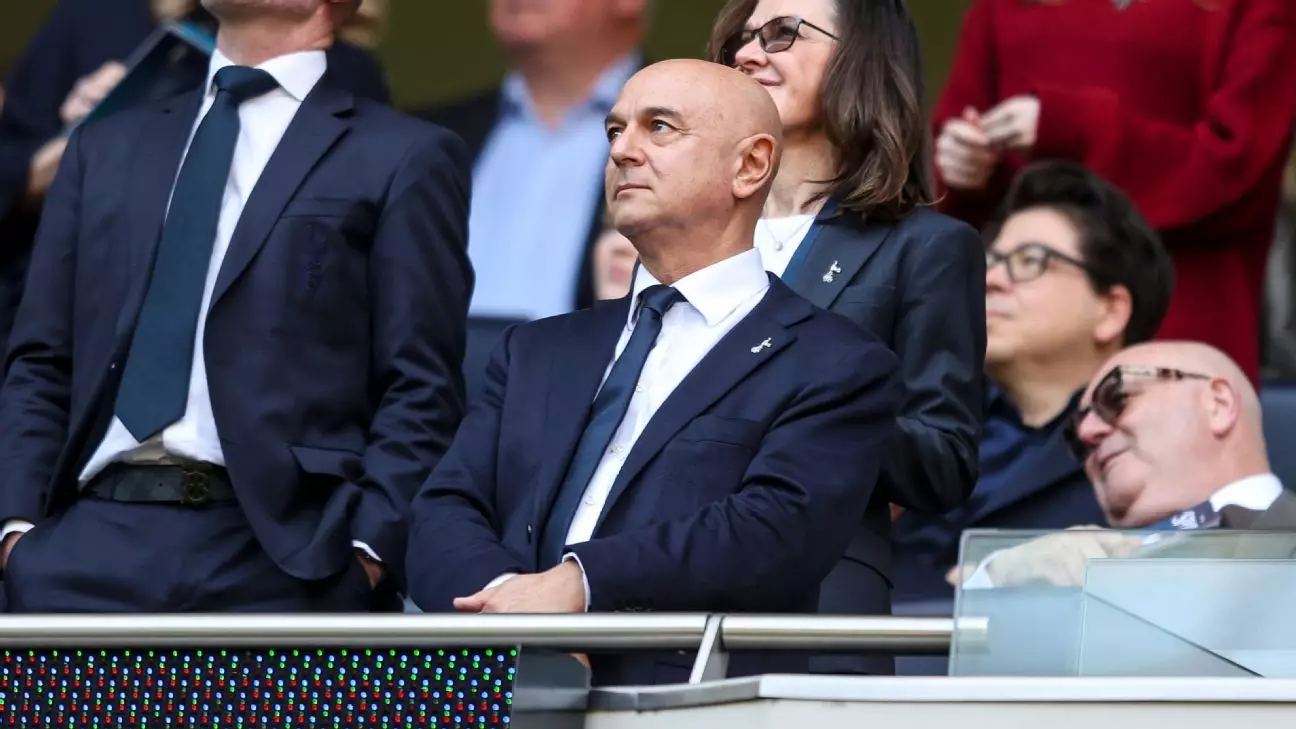Daniel Levy, the chairman of Tottenham Hotspur, stands at the crossroads of an impending storm, characterized by fluctuating performances on the pitch and the immense pressure exerted by frustrated fans off it. In his latest statement regarding the club’s financial results, Levy attempted to navigate the turbulent waters of public discontent, declaring the 2024-25 season “highly challenging.” This phrase encapsulates more than just the current league standings; it reflects the ongoing struggle that Spurs face in aligning their financial strategy with fan expectations. The scrutiny of Levy’s leadership is palpable, a testament to the heightened sentiment of supporters yearning for tangible on-field success to match a narrative of off-field prosperity.
Balancing Finances and Ambitions
Levy’s defense of the club’s transfer spending extends beyond the mere act of writing cheques; it delves into the philosophy of sustainable club management. With over £700 million net invested in player acquisitions since the opening of their state-of-the-art stadium in 2019, Levy argues for a need to strike a balance between ambition and fiscal responsibility. The juxtaposition of being the ninth richest club in the world while also watching a disappointing Premier League performance adds layers to Tottenham’s narrative. Levy’s assertion that the spending must align with the club’s sustainable operating revenue is reasonable; however, this reasonable approach may be interpreted as fiscal conservatism in an industry often driven by emotion and aspiration.
Yet, the question remains: Can a club with such financial resources justify consistently underwhelming returns on the pitch? The challenge for Levy lies in recalibrating an expectation that financial clout automatically translates to silverware. Clubs worldwide, particularly in the Premier League, show that transfer spending can yield varying results. Tottenham’s recent underwhelming form suggests that money alone does not dictate success, and supporters are understandably disillusioned when expenditure fails to yield the expected dividends.
Fan Sentiment and Activism
The frustration of Tottenham supporters has coalesced into organized demonstrations against Levy and the club’s ownership. When fans rally against what they perceive as mismanagement or a lack of ambition, it signifies a deeper sense of betrayal—an expectation of reciprocation that the club will invest not only in player signings but also in a competitive spirit that promotes winning. The significant distress felt by the fanbase reveals the psychology around modern football; for many, emotional investment is directly correlated to tangible success, and any perceived negligence in that equation inevitably leads to protests and outbursts.
During a particularly tumultuous February, many fans took to the streets ahead of a Premier League match against Manchester United, showcasing their dissatisfaction vocally. Their desire for change is not merely about transfers but about a holistic perception of what it means to be a supporter of Tottenham Hotspur—a club with a rich history and a legacy that many feel is being jeopardized by indifferent leadership.
Current Struggles and Future Prospects
As Spurs find themselves in a precarious 14th position in the league, the reality is that their hopes of securing any silverware rest solely on their performance in the UEFA Europa League. Despite their historic significance, the prospect of another season without a trophy looms large, amplifying the disappointment felt across the fanbase. Levy’s comments regarding the critical need for smart purchases reflect an understanding that managerial turnover and squad overhauls have not yielded the stability or success desired.
The departures of key players like Harry Kane to Bundesliga giants Bayern Munich and an alarming decrease in UEFA prize-money have only added to the malaise that has gripped the club. With a new head coach, Ange Postecoglou, the club faced scrapes with form and injuries that derailed what was supposed to be a renaissance after the chaos of previous managerial changes. Despite achieving Europa League qualification in the previous season, the current campaign’s chaotic unraveling prompts deeper introspection on consistency—something Levy must address beyond merely providing financial explanations.
A Comprehensive Approach to Future Investment
Tottenham’s struggles are indicative of a broader issue within football, where financial acumen often outpaces the ability to transform that wealth into tangible success. The club’s diversified income strategy, highlighted by Levy, is commendable; however, it should not act as a shield against criticism when performance falters. The prevailing sentiment emphasizes that financial stability cannot be the sole focus when the club’s cultural and historical identity calls for competitive integrity.
For Levy to regain the faith of supporters, it requires not just a re-evaluation of fiscal strategies but a deeper understanding of football as an emotional investment. The challenge lies in marrying financial prudence with passionate aspirations—something that has eluded Tottenham in recent times. Ultimately, the survival—and revival—of this great club may hinge on its ability to not just weather the storm but to emerge from it with a renewed vision that inspires both fans and players alike.


Leave a Reply